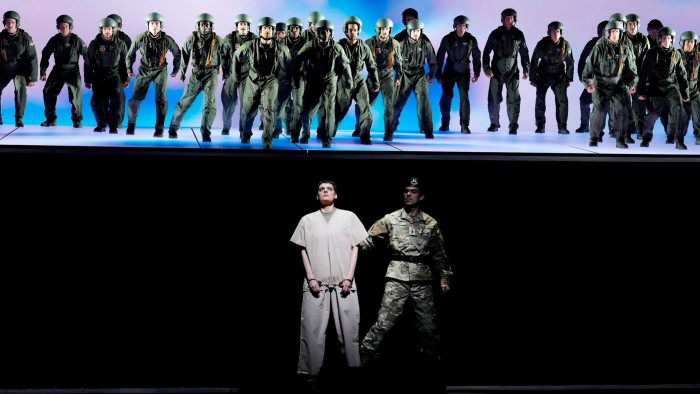Unlock the Editor’s Digest for free
Roula Khalaf, Editor of the FT, selects her favourite stories in this weekly newsletter.
This article is part of FT Globetrotter’s guide to New York
Peter Gelb, the general manager of New York’s Metropolitan Opera, has a problem on his hands: even if the Met sold each of its 3,800 seats, for every night of the season, the ticket sales would not sustain the costs of running the nation’s largest opera house.
Ticket prices range from $25 per seat up to $250,000 for a box on opening night. But Gelb has to pay some 3,000 people to put on a show: an entire symphony orchestra, an 74-strong full-time chorus, wigmakers, stage technicians, stage hands and more — before even signing a cheque for a world-class soloist.
“ ,” says Gelb. In July 2023, the Met had more than $300mn in its endowment fund; six months later it was down to $255mn. The house cannot survive without donors. But the old donors are dying, and Gelb needs to find new ones. “Unfortunately, the triple-digit billionaires who live in this country don’t seem to like the performing arts,” he says. “It’s on the borderline of impossible.”
But some of Gelb’s numbers are pointing downwards in a more positive manner. When he took over nearly two decades ago, the average audience member was in their mid 60s. Now they’re 44. It’s the result of numerous initiatives launched by Gelb to broaden and diversify the house’s audience. These include educational programmes that bring students to dress rehearsals, live-streaming productions in cinemas around the world, a more active social media presence and discounted tickets for people under 40.
A large minimalist painting of a drone hangs behind Gelb in his office. It’s a commissioned artwork for a contemporary opera called Grounded by composer Jeanine Tesori, which debuted in September. It follows an F-16 fighter pilot who becomes pregnant while on leave from Iraq. Instead of going back to combat, she is assigned to become a remote drone operator out of Las Vegas. The subject matter is heavy but the opera has moments of brevity, eliciting chuckles from the Met’s audience on more than one occasion when I attended. Gelb believes that new works as such are the only way to keep opera alive. “No art form can continue just by recycling the same work over and over and over again,” he says
According to Gelb, it’s tricky to attract opera-goers with contemporary classical music because there is a widely accepted preconception that it is “bad” — the rise of atonal music in the early 20th century led to decades of classical compositions that lacked melody and “alienated” large swaths of the audience (think of Alban Berg and Anton Webern). But today’s younger listeners may have missed this entire period, Gelb suggests, and therein lies the opportunity: “We can form their views of contemporary classical music from scratch.”
The Met is involved in the creation of new works from start to finish: fostering contemporary composers, commissioning their operas, and showing them to the public. Four premieres a season is the goal. There’s no guarantee that the audience will like them. But Gelb thinks the potential benefits are worth the risk. His bet seems to be paying off. Last season, about 170,000 tickets were sold to people who had never been to the Met before, the most ever in a single season (in the last full pre-pandemic season it was approximately 136,000).
Elsewhere, other companies are making the same bet, but with different financing. At Vienna’s Volksoper, about 80 per cent of its funds come from the Austrian state. (In Austria, an official body negotiates the budget on behalf of certain houses, including the Volksoper.) “No political party says we should cut funding of the arts,” says the Volksoper’s director, Lotte de Beer, adding that opera is seen as core to Vienna’s value proposition. “Every euro [the state] spends on art you make back and more.” With these subsidies, the smaller house of 1,261 seats can afford to commission and stage contemporary pieces — it aims to present at least one world premiere a year — which generally don’t sell as well as the classics. But at least a quarter of its audience is under 30 years old.
And once people discover opera, they tend to come back, says Gelb. So the challenge is one of awareness — that opera exists. To this end, the Met has invested in its presence on social media, and hired the Boston Consulting Group to help with its audience-growth strategy.
For the performers, an advantage in putting on new work is that the composer is alive and involved in the production. While writing Grounded, Tesori continuously adapted the lead role for mezzo-soprano Emily D’Angelo, who turned 30 on opening night. “She came and saw a session with my voice teacher and we showed her my voice, and talked, and mostly sang — and then she went away and started writing,” D’Angelo recalls. The two of them continued to co-ordinate as Tesori wrote the piece over the next six years, “a once in a lifetime” experience, as D’Angelo put it.
Opera may be struggling but, according to D’Angelo, marketing it as such is not useful. “Opera is not charity,” she says. “It will improve your quality of life if you are exposed to it. That is the most important thing. If [people] are exposed to it, they will enjoy it. It’s just a matter of how to get them there.”
Which Met Opera production have you enjoyed the most, and are you planning to see any this season? Tell us in the comments below. And follow FT Globetrotter on Instagram at @FTGlobetrotter
Read the full article here

